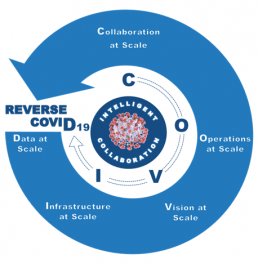After major public health emergencies in recent years, such as the 2012 MERS coronavirus outbreak in Saudi Arabia and the 2014 Ebola outbreak in Western Africa, we’d hoped we would be better equipped for the next one.
But the outbreak of the new coronavirus has caught us unprepared, causing profound disruptions on multiple fronts. This time we have no choice but to address the crisis with a more sustainable approach, building a stronger and more resilient global ecosystem to respond to health emergencies.
What Are the Core Expectations of the Life Sciences Industry?
The life sciences industry is at the frontline of the global fight against COVID-19, and is expected to operate at full speed to help healthcare systems around the world handle the pandemic and minimize its impact as soon as possible. While there is still no effective treatment against the novel coronavirus, all eyes are on pharma as the industry searches for a cure.
The industry is struggling to speed up efforts in many directions in parallel. Companies have to operate around the clock — whether to develop rapid diagnostic tests, repurpose existing therapies for COVID-19, or discover specific treatments or vaccines.
Meanwhile, many ongoing clinical trials in non-COVID-19 therapeutic areas have been put on hold.
Life science companies are also under enormous strain to handle supply chain operations to ensure reliable supply of critical products both for emergency and ongoing medical needs. Organizations will also need to expand production and distribution capacity for future therapies currently under development.
What’s the Way Forward for European Life Sciences Organizations?
During these times of crisis, life sciences organizations need to rapidly mobilize their capabilities simultaneously across a broad range of tasks and business areas. This can only be achieved by leveraging the power of technology and by expanding intelligent collaboration to unprecedented levels.
How can European life sciences organizations fast-track efforts to survive during the crisis and successfully adapt to the new normal in the post-pandemic era?
IDC has developed a reverse COVID-19 fast-track approach for life sciences, to take industry efforts to scale across the following key pillars: Data, Infrastructure, Vision, Operations, and Collaboration. These key pillars can be acronymized as the backronym of COVID:
- Data at scale: Data and analytics are the key weapons in the fight against COVID-19. The ability to harness the power of multisourced data at the largest possible scale will be a key determinant of success. The use of real-world data must also be enhanced to support the generation of critical evidence needed to accelerate time to market for products in all therapeutic areas.
- Infrastructure at scale: Organizations will need to establish scalable, high-performing, and secure ICT infrastructures to ensure the rapid deployment of new collaborative and extended work models. Business solutions’ modularity and scalability, alongside agile delivery models such as cloud, will facilitate rapid adaptation to growing and changing demands.
- Vision at scale: Having a vision shared on a broad scale will be essential for success. It’s also imperative that companies elaborate a longer-term vision, looking beyond the current emergency, and start to build “ecosystem-aware” strategies to strengthen their R&D and operational capabilities.
- Operations at scale: The COVID-19 crisis calls for more intelligent, data-driven systems for faster and more effective decision making, and reinforces the need to automate operations across the whole value chain. Life sciences firms will need to rely on new and more sophisticated “automation toolkit” technologies such as RPA, workflow integration platforms, AI, and the related business and IT services.
- Collaboration at scale: The COVID-19 pandemic has made global collaboration a must for the life sciences industry. Intelligent use of more mature models, such as cloud-based secure collaboration platforms, will be central to bring data, infrastructure, vision, and operations to the necessary scale to quickly overcome the current crisis. In fact, our framework positions intelligent collaboration as a cornerstone of success in the battle against COVID-19:
IDC’s “Reverse COVID-19 Fast Track” for Life Sciences

How Do We Prepare for the New Normal?
Harnessing the power of ICT and mastering intelligent collaboration at scale is imperative to achieve the necessary scale, scope, and speed of efforts during the crisis. But companies must also look beyond the immediate impact and start planning for the post-pandemic era.
Forward-looking organizations must make their strategies more “context aware,” adapting to the broader ecosystem-wide vision and dynamics in the new normal.
The sustainable impact will depend on the broad-scale availability and interoperability of data, scalability of infrastructures and solutions, and agility and resilience of supply chain operations — all led by a broadly shared ecosystem-wide vision and intelligent multistakeholder collaboration.
Although the pandemic is putting enormous pressure on the industry, it also presents major opportunities for life sciences organizations and their technology partners in Europe and beyond.
If you would like to learn more about opportunities, best practices, and essential guidance, please see our dedicated research program IDC Health Insights: European Life Science and Pharma, or contact us directly: Nino Giguashvili or Silvia Piai.

